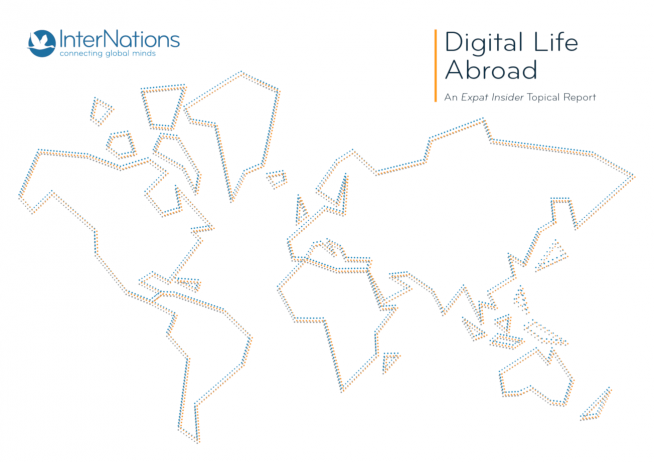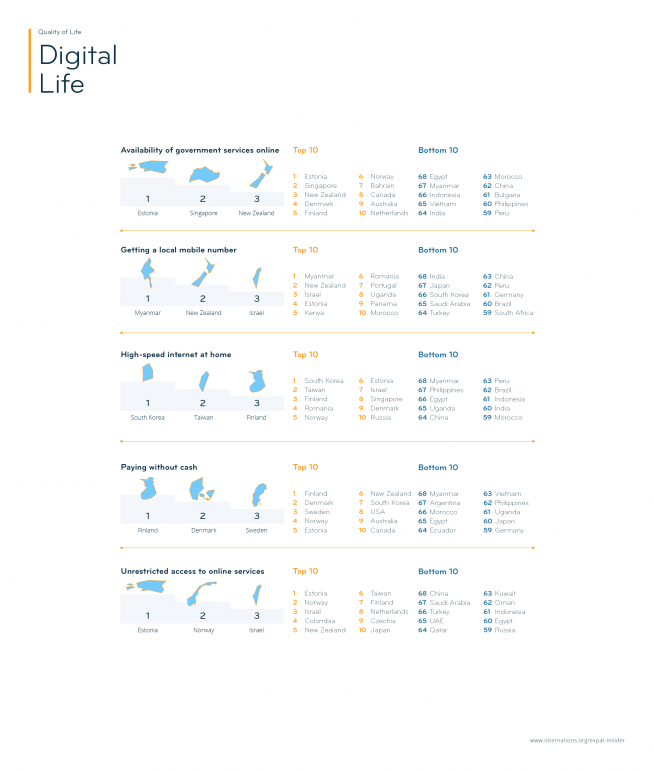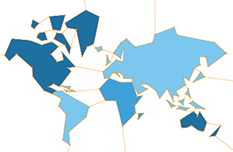Digital Expat Havens around the World
- Estonia provides the best government services online.
- Paying without cash is hardest in Myanmar.
- The top 4 countries for cashless payment are in Northern Europe.
- Expats in South Korea have the fastest internet.
- 83% of expats in China are unsatisfied with access to social media.

Click here to download the full Digital Life Abroad Report.
No Red Tape in Estonia Thanks to Online Services
Expats looking for a country without bureaucratic hurdles need look no further than Estonia — the best-ranking country in 2018 for the availability of administrative and government services online. While globally, 55% of expats are satisfied with this factor, almost all expats in Estonia (94%) are happy, with 70% even giving the highest rating. A US American respondent agrees: “Estonia is amazing. There's not a country in the world that has embraced the future and the digital revolution so completely.”
Estonia is amazing. There's not a country in the world that has embraced the future and the digital revolution so completely.
Similarly, 60% of respondents in Singapore (second-best country) rate the availability of such services as very good. In third place, 93% of expats in New Zealand are generally happy with the online services available. Nordic powerhouses Denmark (4th out of 68), Finland (5th), and Norway (6th) follow.
At the other end of the scale, the bottom 10 countries for access to online administrative services cause expats frustration. In Egypt (68th), as well as Myanmar (67th), close to seven in ten respondents (69% each) are dissatisfied with the online availability of government services, whereas the global average is just 26%. In Indonesia (66th), one in five expats gives the availability the worst possible rating.
SIM Card in Seconds in Myanmar
Despite a poor performance in the other factors of the Digital Life subcategory, Myanmar outdoes itself when it comes to expats’ ease of getting a local mobile phone number. In Myanmar, 96% of expats think it is easy, with four in five even saying it is very easy. However, satisfaction with this factor is generally high: 86% of expats worldwide think it’s easy, and 58% find it very easy.
Expats moving to New Zealand need not worry about feeling cut off from the rest of the world, despite the distance: although claiming second place in this ranking, an even higher share of expats there (98%) are satisfied with the ease of getting a local number, though they are slightly less likely to find it was very easy (79%).
The most difficult countries for expats to get a local number are India, Japan, and South Korea — in that order. In India, almost two out of five expats (37%) say getting a mobile phone number was hard, compared to just 7% of expats globally. In Japan, around a quarter (24%) consider it difficult, while South Korea ranks 66th, with over one-fifth (22%) saying that it is a struggle to get a local number.
In the case of the bottom countries, the language barrier may explain some of these difficulties. Legal requirements can also differ: in low-ranking Germany (61st out of 68), for example, over one in ten expats (11%) struggle getting a local number. Since 2017, buying a new SIM card there requires providing identification; even if it is a prepaid one.
Nordics Miles Ahead in Cashless Payments
The Nordic countries dominate the top 10 for ease of paying without cash: Finland claims first place, with Denmark, Sweden, and Norway immediately behind. In Finland, 96% of expats agree that cashless payment is easy, with almost nine in ten (88%) saying it is very easy. Similarly, in Denmark, 88% completely agree there are plenty of cashless options. Across the bridge, not a single expat in Sweden regards paying with card, app, etc. as difficult.
Norway accompanies its northern neighbors in the top 5, scoring fourth place, while in fifth sits quasi-Nordic Estonia. As well as offering widely available e-government services, Estonia proves itself a digital payment haven — 95% agree that paying with card or app is easy.
The worst country in this ranking is Myanmar, where almost three-quarters (74%) think it’s hard to pay without cash, and three in ten expats give this factor the worst possible response. Argentina, despite being the second-worst country, comes — with its 37% negative ratings — far closer to the global average of 13% than Myanmar. Morocco (66th), Egypt (65th), and Ecuador (64th) join Myanmar and Argentina in the bottom 5.
I don’t like the dependence on cash payments in Germany.
Only one European country is found in the bottom 10: fiscally antiquated Germany. In contrast to the low global average of 13%, in Germany, a far higher share (35%) find it hard to pay without cash. A British expat even explicitly names the “dependence on cash payments” as a negative to life in Germany. The country lags far behind the forward-thinking Nordics: according to the Institute of Economic Research, for every cash machine in Germany there are 13 cashless payment terminals, while in Sweden, this number rises to 91.
No Chance of a Digital Detox in South Korea
Unsurprisingly, the indisputable leader of the fast-internet world tops the table for the ease of accessing high-speed internet: South Korea ranks 1st out of 68, with 98% of expats there generally and over three-quarters (76%) completely satisfied with this factor. The State of the Internet Connectivity Report, published by cloud delivery service provider Akamai, puts South Korea’s average connectivity speed at 28.6 Mbps in 2017, at least 5 Mbps ahead of the second-fastest country Norway. In Expat Insider 2018, Norway places fifth for this factor — with a more than respectable 95% of expats satisfied with their internet speed at home.
Another northern European country joins the top 5: Finland places third, with 96% agreeing that high-speed internet access is easy to get. In Taiwan (2nd position) the same proportion of expats (96%) are satisfied.
At the bottom of the table, it is again expats in Myanmar that struggle the most — 58% are dissatisfied, and over one-fifth (22%) give this factor the lowest rating. In 67th place is the Philippines: just under half the expats there (49%) report finding it hard to access high-speed internet, and a fifth even find it very difficult. These high percentages don’t come as a huge shock, considering the average connectivity speed in the Philippines is one of the lowest in the world at 5.5 Mbps.
Joining Myanmar and the Philippines in the bottom 5 are Egypt (66th), Uganda (65th), and China (64th).
China’s Great Firewall and Highly Censored Saudi Arabia
Not only do expats in Norway and Estonia enjoy excellent high-speed internet, they are also free to surf the web unhindered. In Estonia, expats feel the least restricted when using online services (such as social media): 96% of respondents give this factor a favorable response, and 86% couldn’t be happier, whereas the global average of very happy expats is only 58%. Taking second place, Norway’s rate of complete satisfaction is 81%.
Impressively, in both Estonia and Norway as well as third place Israel, less than 1% of expats have negative feelings about the access to online services. Following the country’s more-than-respectable ranking for high-speed internet access (7th), 95% of expats in Israel are satisfied with their access to online services like social media. Globally, the average satisfaction rate for expats is generally very high at 80%. The top 5 countries in this ranking, however, all have over 90% satisfaction rates — Colombia (4th) and New Zealand (5th) both have 96%.
Lagging far behind the other 67 countries, China unsurprisingly comes in last place for this factor. Proving the “Great Firewall of China” as impenetrable as ever, 83% of expats give their access to online services like social media a negative rating. More than half (52%) even say the accessibility of online services is very bad, whereas globally only 3% agree. With China — already the largest internet censorship regime in the world — on a crackdown mission on non-government-approved VPNs used to access the global web, this percentage could be set to rise even further. “The potential ban on private VPNs,” shares a Dutch expat, “is a significant reason to leave if implemented.”
In the rest of the bottom 10, the Gulf States have an overwhelming presence. Saudi Arabia, though not rated as poorly as China, takes second-to-last place, with almost half the expats (46%) feeling restricted in their access to online services. Four other Gulf States join Saudi Arabia in the bottom 10: the UAE (65th), Qatar (64th), Kuwait (63rd), and Oman (62nd), while Turkey ranks 66th. Breaking away from the Gulf States’ trend in this ranking, Bahrain evades the bottom 10, ranking 49th.
Infographic
Further Reading
- Süddeutsche Zeitung. Das Ende der Anonymität. 11 Jul 2017.
- The Local. Will the German love affair with cash ever end? 2 Jan 2018.
- Akamai. State of the Internet Connectivity Report. Q1 2017.
- Phys Org. Foreign companies in China brace for VPN crackdown. 30 Mar 2018.
- Expat Insider 2018 – Where Expats Enjoy Life Abroad




